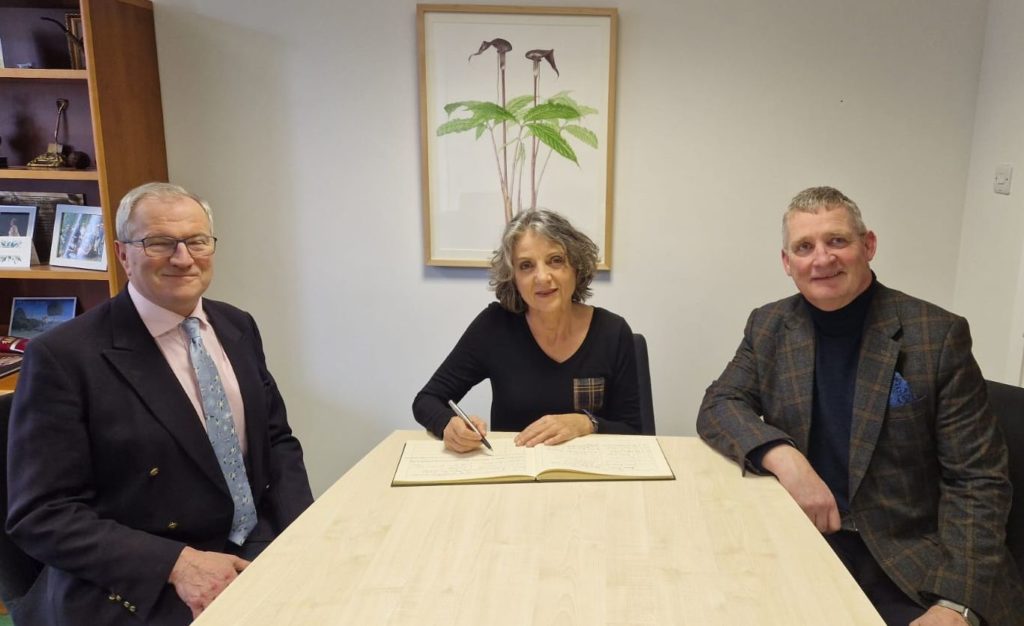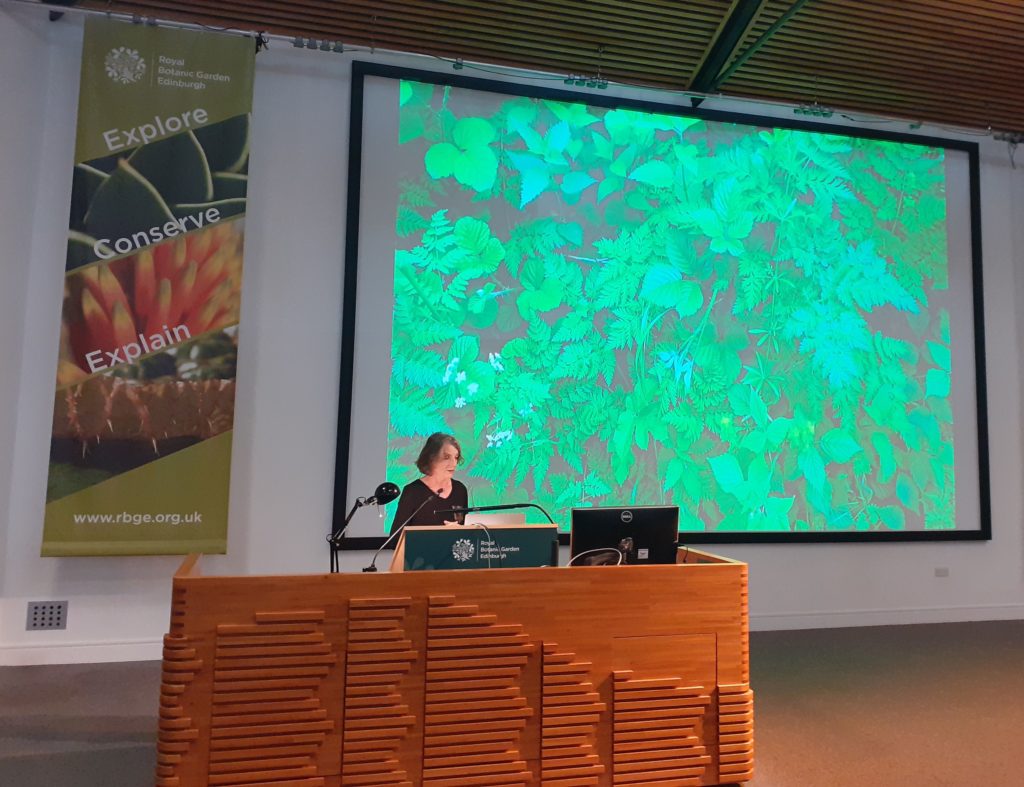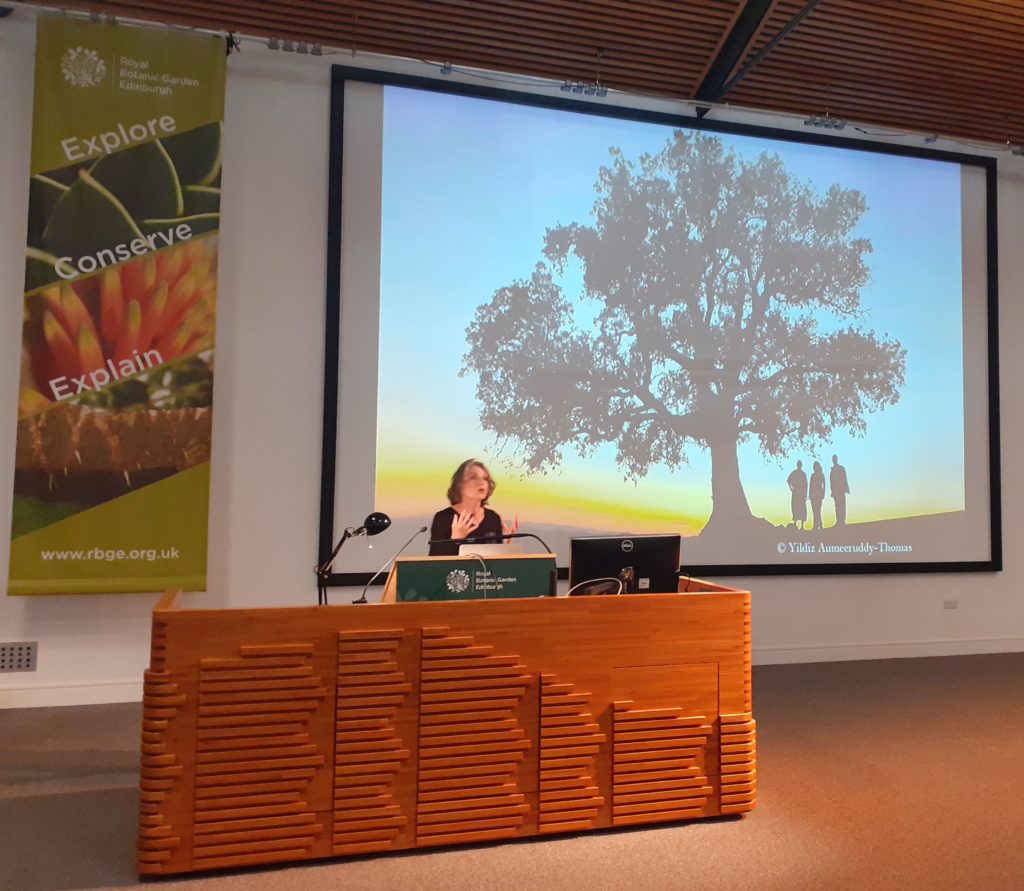Professor Sandra Díaz is one of the world’s most influential scientists: professor of ecology at the National University of Córdoba, senior researcher at Argentina’s National Scientific and Technical Research Council (CONICET), foreign member of the Royal Society, member of the First Minister of Scotland’s Environmental Council, and now recipient of the prestigious RBGE Medal.
With over 78,000 citations of her work, Díaz is in the top 1% most-cited scientists worldwide – a remarkable achievement given the dominance of physical sciences and medicine, not to mention male authors, among citation rankings. In 2019, she was chosen as one of Nature’s Ten people who mattered in science. “Our safety net is stretched almost to breaking point,” she said at the time. “We cannot live a fulfilling life, a life as we know it, without nature … a new economic model is needed for nature and people”.
Plants are central to this. “Plants are the pulsating heart of the biosphere,” Díaz told UN Women last year. “Without plants, we literally would not be human; we would not be human at all.” And time is running out to save them. Writing for the Royal Society about the new Kunming-Montreal Global Biodiversity Framework negotiated late last year, she predicted, “The future of nature and its contributions to people will strongly depend on what we collectively do within the next 10 years.”
So we were honoured to welcome Professor Díaz to give a sell-out lecture at our Edinburgh Garden yesterday. The talk – entitled Alchemists and Gardeners – Why Care About Plants on Earth – expanded on her vast scientific work into plant functional traits (as published in Nature) and her experience of co-chairing the hugely influential Intergovernmental Science–Policy Platform on Biodiversity and Ecosystem Services (IPBES) Global Assessment Report on Biodiversity and Ecosystem Services.

‘Green furniture’
Díaz began her talk challenging the popular conception of plants as merely a backdrop to life, as ‘green furniture’, referring to the condition known as ‘plant blindness’ which fortunately most of the audience on this occasion did not suffer from. Instead, she described how plants are the “supreme alchemists,” chemically running the world by the transformation of water, carbon dioxide and nutrients into life.
Furthermore, she explained, we ourselves are completely entangled with this process. The IPBES Global Assessment was the first – and most comprehensive to date – global, intergovernmental stocktake of this interdependency. One of the most important things she learned in the creation of the report, Díaz says, was the importance of framing the narrative around our relationship with biodiversity: not as something separate, to be either exploited or protected, but as a living world with which we are completely interwoven. We depend upon nature entirely, and every decision we take affects nature, both locally and remotely: “We are just threads in a living tapestry.”
Nature’s contributions to people go far beyond ‘ecosystem services,’ Díaz says. And our consideration must go “beyond narrow models of stocks and flows, supply and demand.” Yes, plants provide food and energy, regulate climate and water, underpin all aspects of our health, and are the basis of our economy. But they are also the inspiration for discovery, and for “the stories and images that support our identity as unique individuals and members of cultural traditions.”
Human history, for the past millennium, could be told through plants – from opium to ebony, cacao to cotton, potatoes to soy, rubber and oil palm. “Our origins and destiny are inextricably entangled with those of plants,” Díaz contends. “We are not really ourselves without them.”
A global spectrum
A recent assessment by scientists at the Royal Botanic Gardens, Kew, shows that plants as a whole are becoming extinct at some 500 times the background rate. However the IPBES Global Assessment found that some groups of species (such as the cycads) are doing worse than others (such as legumes). To explain some of these patterns, Díaz introduced us to her work on functional traits. Specifically, six key traits vital to plant existence (height, stem specific density, leaf area, leaf mass per area, leaf nitrogen content per unit mass, and diaspore mass) mapped for an astonishing 40,000 species representing hundreds of plant families from across the globe.

The resulting principal component analysis provided “the first picture of the essential functional diversity of vascular plants at the global scale,” she explained, a sort of mappa mundi of all the ways it is possible to be a plant. Crucially, it showed that size of both the whole plant and its organs, such as leaves and seeds, are crucial aspects of plant life, and that many plants conform to two basic sets of strategies: those that are retentive, slow-growing, and long-lived vs. those that are acquisitive, fast-growing, and short-lived.
Drawing together this research with the Global Assessment, Díaz explained that plants in some areas of the spectrum are more at risk than others. “We know that the fabric of plant life is shrinking and unravelling,” she says, “and this is far from random; it’s highly non-random.”
While the plants most at risk may be superficially very different and phylogenetically unrelated, they are often (though not always) those that are slow-growing, retentive long-lived, and poor at recovering from disturbance. And the acquisitive plants – which include some of our most common crops and agricultural weeds – thrive in our presence. “Wherever we go, we leave a landscape dominated by them. We are pushing the spectrum towards acquisitiveness,” Díaz says. It’s a form of artificial selection.
To summarise, human activity has had, and continues to have, a double impact on the fabric of life: a decrease in the total number of species, and a subtler, perhaps more insidious, effect by which we are “gardening for and against particular life forms.” Both deliberately and collaterally we are creating a “well-mixed, weedy world, dominated by smallish, fast growing organisms … Plants might be the supreme alchemists, but whether we like it or not, we are the supreme gardeners. The whole planet now bears our stamp.”
And while this “well-mixed, simplified global garden” is pretty good, she says, at producing food, it is not so good for meeting our other needs. The consequences not only affect our planet, but lead to inequality and suffering in society.
Collective action
Since it is clearly too late to turn back the clock, Díaz believes, we must now “accept our responsibility as gardeners.” We have a clear obligation – which many conservation organisations and botanic gardens are already rising to – to protect those species and ecosystems that are already threatened with extinction. But also, she argues, we must value and protect the smaller, less glamorous patches of nature all around us: in urban gardens and wastelands, roadsides and field edges.
Such humble patches of nature can play a vital role for the planet – as steppingstones and corridors between wild places, as homes and hosts for pollinators and other wildlife, in ameliorating climate and pollution on local scales – but also for us, providing well-documented psychological and physical health benefits, and as the places where most people start their journey learning to appreciate and love nature. Botanic gardens have an important role to play here, says Díaz, helping people understand the value of their wildlife patches, how to nurture them, and recognising that they have a right to them.
While the actions of individuals, botanic gardens and conservation organisations are vital, the IPBES Global Assessment makes clear that a better future is only feasible with transformative change in the ultimate drivers of nature’s decline. Deforestation, pollution, excessive harvesting and climate change issues all have social, economic and political roots. The solutions, Díaz says humbly, go beyond ecological expertise, but boil down to an age-old idea: “putting the common good before fast profits for a few.”
It is evident so far, that top down approaches to this shift are not working. And that individual actions, while important, cannot go far enough. A collective, bottom-up approach is needed, she says, in which all are involved. “Caring for plants goes together with caring for each other.”
Optimism of the will
The wonderful talk sparked a range of insightful questions, from the public to MSc students and university professors! Asked further about the distinction between top-down and bottom-up approaches, Díaz agreed that both are needed: the essential mainstreaming of conservation cannot be achieved by individuals, but governments are simply not acting fast enough. A growing realisation, particularly among the global south, that conservation is a human rights issue, is driving a push for the collective action which brings power to the bottom-up approach.
Finally, asked whether she is optimistic for our grandchildren’s generation, Díaz turned to the words of Antonio Gramsci. “I’m a pessimist of the intellect but an optimist of the will. Everything we see indicates negative trends, and time is running out,” she explained. “But we don’t have another planet. We need to keep fighting because nobody else is going to save us.”

Read more about Professor Sandra Díaz’s visit to Edinburgh at: https://www.rbge.org.uk/news/articles/professor-sandra-diaz-visits-rbge/
